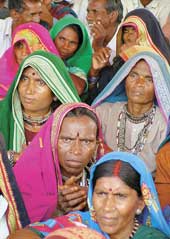 |
| Growing urban area have a major demand for tribal women as domestic helps |
According to a liberal estimate, in Delhi alone there are now more than 50,000 girls from the same region of Jharkhand, mostly Christians, living as domestic working women. Many of them have migrated to different cities, lured by the prospect of some kind of employment and security and by all indications, their number is growing in places like Mumbai, Pune, Calcutta and Ahmedabad.
One day Fr Alex Ekka, himself a tribal, received a phone call from a police station in Delhi. A tribal girl named Anita was in police custody. Such calls are far from rare. Anita came to Delhi along with eight other girls from Ranchi district, with the promise of a placement as a domestic worker on an attractive salary. But the household in Ghaziabad, where she was placed, turned out to be a veritable hell. She was forced to work long hours and live on leftovers. She was not even given enough clothing. She was often beaten by the mistress of the house on flimsy grounds and sexually harassed by the master. She would receive no salary for months. She was not even allowed to go to church, where she could have met other girls. Being unable to bear this any longer, she finally left the house. On her way to the railway station, she met a person who said that he was going to Ranchi the next day. He took her to a studio and attempted to rape her. The police rescued her after a complaint from a passer-by.
Over the years the “Road to Delhi” has appeared quite an attractive option for girls looking for a way out of poverty, hunger and the shattered dreams of a sweet home. Some want to help the family with their brothers’ education or to pay off a mortgage on the fields or cattle. Others could be trying to escape a difficult family situation, such as drunkenness, harshness or ostracism due to pre-marital pregnancy.
Initially, the Catholic sisters organised placement for the girls, hostels where they could stay until they were placed and centres for their training and education. The Religious Order of Mary Immaculate, for example, founded a “ Yuvati Niwas” (youth hostel) in Delhi in 1977 with the mandate of looking after the welfare of young domestic workers. Another centre was established in 1966. But soon many non-religious or purely commercial ‘bureaus’ emerged to profit from this. For each placement, these job providers receive an average of Rs 2,000 and a fee from the employee that varies from a month’s salary, which is about Rs 2,000, to even Rs 200 to Rs 300 every month. The girls pay the fee because they are assured that if they ever lose their job, they would be placed elsewhere and a hostel would be provided for them to stay in the interregnum. Both hostels and the bureau are run by both tribals and non-tribals.
This trend has, over the years, has made the women extremely vulnerable to city life, which they find to be cruel and inhuman. Unscrupulous employers exploit them both economically, physically and sexually. Until recently, the districts of origin of these women were densely forested and although people practised farming and cultivation, the economy was very largely dependent on forests, which were also the source of the society’s spiritual and cultural life besides providing its economic base.
In a forest-based economy, women enjoy considerable economic power and social freedom. The destruction of forests, therefore, has not only caused immense damage to tribal society but has also weakened the position of women and strengthened tribal patriarchy. The fundamental reason for the mass migration of women, therefore, has been the resource depletion and societal disintegration that these women have experienced, coupled with a growing demand for labour in the fast expanding industries and urban centres.
Growing cities like Delhi, with its expanding well-to-do middle class and rich population of traders and industrialists, has created a substantial demand for domestic workers. Tribal girls, particularly those with a Christian background and minimum literacy, fit the bill. Their honesty, meekness, simplicity and cleanliness make them much sought after in this particular job market.
(Excerpts from an article published in ‘Indigenous Affairs’. The author is a guest lecturer in the Xavier Institute of Social Service, Ranchi, and a former political activist.)











